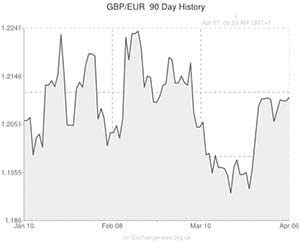
The Pound to Euro exchange rate (GBP/EUR) came within 5 pips of a fresh monthly high on Friday as markets reacted to an article in the German newspaper Frankfurter Allgemeine suggesting that the European Central Bank is considering buying up to €1 trillion of Eurozone bonds as part of a new quantitative easing scheme.
The release prompted GBP/EUR to rally from 1.2095 to 1.2121, as traders reacted to the possibility of fresh stimulus from the ECB.
The German article claimed that officials at the ECB have modelled the economic effects of purchasing around €1 trillion worth of Eurozone bonds. Supposedly the Bank concluded that a €1 trillion QE scheme would likely contribute somewhere between 0.2%-0.8% to the Consumer Price Index, depending on how markets react to the scheme.
ECB Vice President Vitor Constancio denied the rumours and claimed that he doesn’t know anything about the alleged economic modelling. However, it is believed that the article is based on an interview with an unnamed official from the European Central Bank.
CPI inflation is currently running at a 4-year low of 0.5% in the currency bloc and the region could potentially become destabilised if price pressures continue to fall and deflation kicks in. For this reason it is vital that policymakers act to soften the value of the Euro exchange rate and help drive inflation back towards the 2.0% target.
ECB President Mario Draghi opted against loosening monetary policy further at April’s Central Bank meeting. However, Draghi did attempt to weaken the single currency by unleashing a bout of dovish rhetoric: hinting that the ECB is prepared to start a bond-buying scheme to push inflation higher.
If rumours continue to circulate suggesting that the Bank is on the verge of introducing a large-scale quantitative easing scheme then it is likely that the Euro will depreciate against Sterling.
Technical resistance exists at 1.2125, but if that level is broken then Sterling could easily rally back above psychological resistance at 1.2200.
Data this week is expected to print in favour of the Pound with UK Industrial Production set to have accelerated from 0.1% to 0.3% during February and UK GDP likely to have grown by 0.7%-0.8% in the three months leading up to March.
There is also the opportunity for Sterling gains when the Bank of England meets on Thursday if Governor Mark Carney gives a speech with regards to his projected date for the first rate hike. The BoE is almost certainly going to hold rates at 0.50% and refrain from additional QE this time out.
A fall from 1.2% to 1.0% in German CPI inflation is anticipated on Friday and this is also liable to bolster demand for the Pound against the Euro.

Comments are closed.